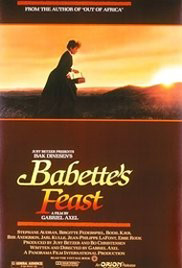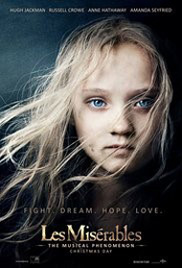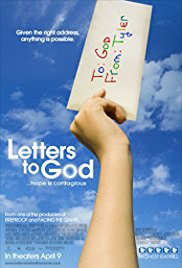
EDITOR’S NOTE: Phil Boatwright recaps some Christmas classics following this column.
KANSAS CITY, Kan. (BP) — Classic Christmas movies range from the silly (“Elf”) to the sublime (“A Christmas Carol”). But there are also movies that catch the reason for the season with nary a “Ho, ho, ho” or a “God bless us, everyone” in their scripts.
Here, I’ve compiled a few cinematic treasures that reflect some of Christ’s directives to us: Reverence (glorify our heavenly Father); Relinquish (give our lives to Jesus); Respect (treat others as we wish to be treated).
Babette’s Feast
 This 1987 film, which won an Oscar for Best Foreign Film, tells the story of a homeless French woman cared for by two religiously devout Danish sisters. The gentle siblings are laboring for their dying church, started long ago by their father but now filled with members who have developed feuds among themselves. The story is set during a bleak and barren frosty winter — the imagery reflecting their dying church because the members have replaced the love of Christ with man’s pious austerity.
This 1987 film, which won an Oscar for Best Foreign Film, tells the story of a homeless French woman cared for by two religiously devout Danish sisters. The gentle siblings are laboring for their dying church, started long ago by their father but now filled with members who have developed feuds among themselves. The story is set during a bleak and barren frosty winter — the imagery reflecting their dying church because the members have replaced the love of Christ with man’s pious austerity.
We come to learn that the French woman once was a famous chef. She has hidden her talents, subjecting herself as a housekeeper for the two sisters. Eventually it’s discovered that she has won a lottery back in her homeland. When the money arrives, she shares her good fortune in a most lavish manner. She asks the sisters if she can provide a special meal for an upcoming church celebration. When the food arrives from far-off regions, consisting of epicurean delights such as live ingredients for turtle soup and other gastronomical surprises these simple people are unfamiliar with, the sisters are at first horrified. Ah, but the gourmet meal serves to reunite this quarreling congregation.
Based on a short story by Isak Dinessen, the subtitled Babette’s Feast is an inspiring tale of devotion (reverence), servitude (relinquish) and caring (respect). (Rated G)
Les Miserables
 Victor Hugo’s 1,200-page novel addresses some of the most profound themes ever placed on paper: man can find redemption, and he can replace anger and fear with compassion and faith. The most powerful component of the book, the plays and the several movie versions has always been Jean Valjean’s conversion once he experiences God’s mercy. Great news: This same spiritual truth remains intact in this 2012 musical adaptation starring Hugh Jackman, Russell Crowe and Anne Hathaway (who won a well-deserved Oscar for Best Supporting Actress).
Victor Hugo’s 1,200-page novel addresses some of the most profound themes ever placed on paper: man can find redemption, and he can replace anger and fear with compassion and faith. The most powerful component of the book, the plays and the several movie versions has always been Jean Valjean’s conversion once he experiences God’s mercy. Great news: This same spiritual truth remains intact in this 2012 musical adaptation starring Hugh Jackman, Russell Crowe and Anne Hathaway (who won a well-deserved Oscar for Best Supporting Actress).
It is a morality play that clearly conveys the difference between the Bible’s Old Testament, where man is dependent upon the laws of God in order to find deliverance, and the New Testament’s revelation of Christ’s sacrifice that paid our sin debt. Though there is some PG-13 content (too intense for little ones), it’s not included to be exploitive, but rather used to give depth to the story and to viscerally work on our emotions. Ultimately, I think you’ll be encouraged by the film’s spiritual resonance.
Not into musicals? Fredric March and Charles Laughton star in this 1935 non-musical version of the Hugo classic. Early on, a scene features a priest confronting French police with their prisoner, a thief who has stolen expensive dinnerware, the only finery the Monseigneur possesses. Rather than accusing the man of robbery, the clergyman announces that the thief was given the utensils. Furthermore, the priest scolds him for not taking the silver candlesticks, which he then gives to the bewildered convict. The expression on the convict’s face is stirring. Due to the man of faith’s compassion, the film’s protagonist turns his life around, serving God and man, including his long-time enemy. (Unrated)
Letters to God
 Unselfishly, 11-year-old cancer patient Tyler Doherty (Tanner Maguire) in this 2010 film begins writing letters to God, seeking care for those he will leave behind. Like Jimmy Stewart’s George Bailey in “It’s A Wonderful Life,” Tyler learns how our words and deeds can affect the lives of so many others. (PG)
Unselfishly, 11-year-old cancer patient Tyler Doherty (Tanner Maguire) in this 2010 film begins writing letters to God, seeking care for those he will leave behind. Like Jimmy Stewart’s George Bailey in “It’s A Wonderful Life,” Tyler learns how our words and deeds can affect the lives of so many others. (PG)
When we toast the holiday with “Peace on Earth, good will to men,” realistically, that wish can only come true as we relinquish our will to Jesus. Man, no matter how good an example you can find, will ultimately love who he wants to love and hate who he wants to hate. A respect for all others comes only when we first reverence our Creator.
Jesus said: “Love the Lord your God with all your heart and with all your soul and with all your mind. This is the first and greatest commandment. And the second is like it: Love your neighbor as yourself. All the Law and the Prophets hang on these two commandments” (Matthew 22:36-40 NIV).
The greatest gift we can receive this Christmas day was given by God some 2000 years ago with the birth of Jesus. Unwrap it. Embrace it. Share it. Then you’ll know the true meaning of “Merry Christmas.”
–30–
Phil Boatwright is the author of “MOVIES: The Good, the Bad, and the Really, Really Bad,” available at Amazon.com.
######
CHRISTMAS MOVIES: Making a list, checking it twice
By Phil Boatwright
KANSAS CITY, Kan. (BP) — I’m making a list (and checking it twice) of some classic DVD holiday gems. Most of the following films focus on the true reason for the season while several others reflect a measure of secular merriment.
“The Nativity Story” (2006) — Though missing some of the grandeur found in the Gospels (I would have loved to have seen the angels proclaiming the birth of our Savior), this 2006 film successfully fleshes out Mary and Joseph, illustrating their devotion to God and to one another. It is a true love story in so many ways. (PG)
“King of Kings” (1961). Orson Welles’ narration lends authority to this 1961 production, as does the great Miklos Rozsa score. Although we must endure Jeffrey Hunter looking a little too GQ with his striking blue eyes and chiseled good looks, this beautifully filmed widescreen adaptation is an earnest account, an epic that depicts Jesus’ life from manger to resurrection. (Unrated)
“Jesus of Nazareth” (1977). Franco Zeffirelli’s grandiose production is considered by many to be the best screen version of the life of Christ. A very moving and spiritual experience, with many memorable performances, including those of Robert Powell, Anne Bancroft, Ernest Borgnine and Laurence Olivier, the production is acclaimed for its thorough biblical and historical research. The length (371 min.) will take a couple of evenings to digest, but I recommend the effort. (TV-G)
“Elf” (2003). Now a comedy classic, a 6’2″ elf leaves the North Pole in order to find his father. Will Ferrell plays a Santa little helper with abandon and glee. A complete innocent, he approaches everyone with an infectious child-like wonder. There is simply no guile in him. And once past the fact that he’s dressed in green tights, those around him also begin to catch the true meaning of the holiday.
Okay, that “true” meaning here is typical of Hollywood’s holiday movies. The screenwriter’s idea of the real meaning of Christmas has to do with the appreciation of kith and kin, not the birth of the Savior of the world. But the filmmakers aren’t really trying to convince us of anything. They’re just trying to be funny in creating a story about a 6’2″ elf. Rated PG, Elf contains a few minor expletives and a couple of jokes that border on crudity, but overall it’s a delightful holiday concept.
“The Bishop’s Wife” (1947). In this film about an angel aiding a struggling minister, I marveled at the ending sermon by the bishop, played by David Niven, starring alongside Cary Grant and Loretta Young. Standing behind his pulpit, the reverend reminds his parishioners to focus attention on Christ. “All the stockings are filled, except one. We’ve even forgotten to hang it up. The stocking for the child born in a manger. It’s His birthday we’re celebrating. Don’t let us ever forget that. Let us each ask what He would wish for most. And then, let each put in his share.” Characters in 1947 movies were allowed to talk like that.
“A Christmas Carol” (1951). Alastair Sim stars in perhaps the best of the Scrooge movies. The box set includes both B&W and colorized versions. There are a couple of scary moments in the presentation, which may be unsuitable for little ones, but this is a most entertaining parable about a man finding redemption.
“The Christmas Miracle of Jonathan Toomey” (2007). A mysterious recluse also happens to be the best wood carver in the valley in this film starring Tom Berenger and Joely Richardson. Slowly the woodcutter finds his world transformed by a young boy and his mother who have asked him to carve a yuletide scene. This charming film includes a reverence for spiritual matters — prayers are spoken, church is attended and the main characters acknowledge the birth of Christ. (Unrated)
“Miracle on 34th Street” (1994). The manager of a New York department store hires Kris Kringle to be the store Santa in this version of the classic tale starring Richard Attenborough and Mara Wilson. Soon the old fellow has to convince the woman and her precocious daughter that he truly is Father Christmas. A delight and a rarity, as it is one of the few worthwhile remakes, full of laughter, poignancy, charm and noteworthy for containing both visual and verbal Christian metaphors. What’s more, the script points out that Santa Claus is a symbol. The scene where Santa communicates with a little deaf girl is worth the rental price. (PG)
“It’s A Wonderful Life” (1946). (You didn’t think I’d forget this old chestnut, did ya?) Jimmy Stewart’s George Bailey is given the opportunity to see what his community would have been like if he had never been born. Director Frank Capra reminds us that our compassion and responsibility make a difference in the lives of others.
Yes, there are other Christmas classics. Should the Lord tarry, we’ll feature those next year. Merry Christmas, everybody!

















